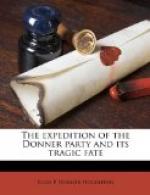Quickly the Indian dismounted, looked his pony over carefully, cinched the blanket on tighter, led him to the water’s edge, and turned to me. I shuddered, and when all was ready, drew near the deep flowing current tremblingly, yet did not hesitate; for my loved ones were beyond, and to reach them I was willing to venture.
The Indian mounted and I was placed behind him. By sign, he warned me not to loosen my hold, lest I, like the passing branches, should become the water’s prey. With my arms clasped tightly about his dusky form, and his elbows clamped over them, we entered the stream. I saw the water surge up around us, felt it splash over me! Oh, how cold it was! I held my breath as we reached the deepest part, and in dread clung closer to the form before me. We were going down stream, drifting past where Jakie stood! How could I know that we were heading for the safe slope up the bank where we landed?
The Indian took his dollar with a grunt of satisfaction, and Jakie bade me wave to the friends I had left behind, as he put me on old Lisa’s back and hurried off to grandma, Leanna, and Georgia, waiting at the gate to welcome me home.
Georgia had a number of patches of calico and other trinkets which she had collected for me, and offered them as soon as we had exchanged greetings, then eagerly conducted me about the place.
Grandma was more energetic and busier than at the Fort, and I could only talk with her as she worked, but there was so much to see and hear that before nightfall my feet were heavy and my brain was weary. However, a good sleep under the roof of those whom I loved was all the tonic I needed to prepare me for a fair start in the new career, and grandma’s assurance, “This be your home so long as you be good,” filled me with such gladness that, childlike, I promised to be good always and to do everything that should be required of me.
Most of the emigrants in and around the Pueblo of Sonoma were Americans from the western frontiers of the United States. They had reached the province in the Summer or early Autumn of 1846, and for safety had settled near this United States Army post. Here they had bought land and made homes within neighboring distance of each other and begun life anew in simple, happy, pioneer fashion. The Brunners were a different type. They had immigrated from Switzerland and settled in New Orleans, Louisiana, when young, and by toil and economy had saved the snug sum of money which they brought to invest in California enterprises.
They could speak and read French and German, and had some knowledge of figures. Being skilled in the preparation of all the delicacies of the meat market, and the products of the dairy, they had brought across the plains the necessary equipment for both branches of business, and had already established a butcher shop in the town and a dairy on the farm, less than a mile from it.
Jakie was busy and useful at both places, but grandpa was owner of the shop, and grandma of the dairy. Her hand had the cunning of the Swiss cheese-maker, and the deftness of the artist in butter moulding. She was also an experienced cook, and had many household commodities usually unknown to pioneer homes. They were thus eminently fitted for life in a crude new settlement, and occupied an important place in the community.




